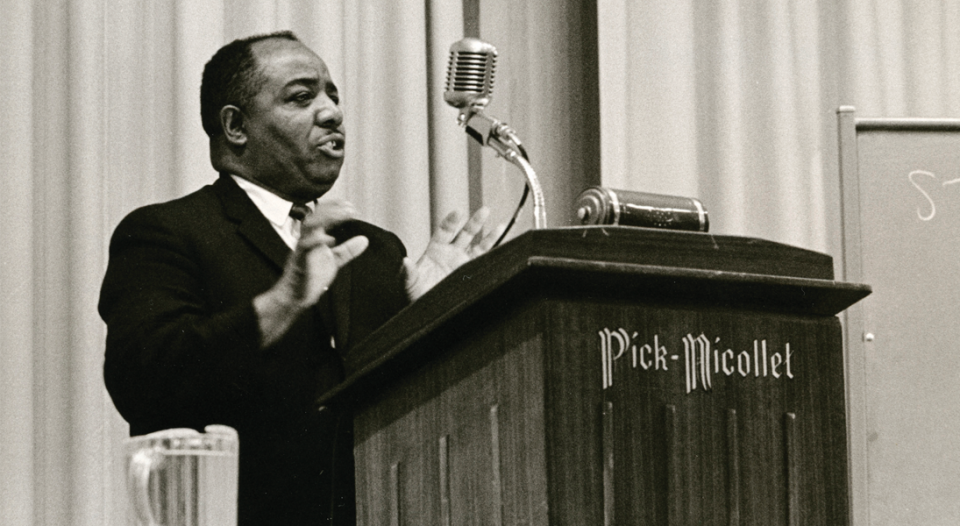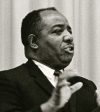Series editor’s note: Throughout 2020, “Deeper understandings” will engage the ELCA’s commitment to authentic diversity. This month’s piece is excerpted from an article originally published in Lutheran Quarterly in May 1968 and is used here with permission. The article’s relevance today is both striking and troubling. It has been edited to make the language gender-inclusive. Trout’s use of “Negro” rather than “Black” has not been altered.
—Kathryn A. Kleinhans, dean of Trinity Lutheran Seminary at Capital University, Columbus, Ohio
This past summer, I visited Detroit, Newark, Chicago, Milwaukee, Cincinnati, and New York. It was interesting to note the unique character which marked the problem in each place. For example, in Detroit, I found people more or less unwilling to talk about the riot (July 23-28, 1967). In fact, they went about as if nothing had happened. At the sight of much of the bombing, I found little children contentedly playing in the rubble. Adults walked by without as much as turning a head. …
As I traveled about the country it appeared to me that the judgment of history is being executed in the streets of our cities. America is learning that you cannot violate God or neighbor with impunity. There is a biblical reference which says that “if one sows to the wind, [one] will reap the whirlwind.” There is another which says, “The fathers have eaten grapes and have put their children’s teeth on edge.” The formidableness of such an inexorable justice is the nature of the challenge facing America, and I am fearful that we are not willing or ready to accept its decree. …
Every ghetto in America is a solemn sign of the cumulative, yet, deliberate sins of flesh against flesh; of [sibling] against [sibling]; of humanity against humanity; yes, of Americans against Americans.
At the sight of much of the bombing, I found little children contentedly playing in the rubble.
I thought as I walked through the streets of Detroit, Newark, and New York City that surely the time must come when we would rise to the height of those ideals which brought this nation into being. You cannot look at the poverty of the urban poor and not remember that the God who gave us life also gave us liberty. To be consigned to the ghetto with hardly a chance to reprieve is a violation of [human] nature.
Someone has compared [humans] to an oak tree. It is impossible to grow a mighty oak in a two gallon pail. Either the oak tree will be stunted and will eventually wither and die from lack of sustenance, or else its roots will burst through their limitations to find soil in which to grow and expand. The analogy is not exact, but it does rightly suggest that the seeking, searching, inquiring spirit of [humanity] cannot be confined; it must be free if [humans are] to achieve to the fullest [their] possibilities as [humans]. …
Judge Wade McCree, who was an old Army buddy of mine, said that the cause for the rioting [in Detroit] was complex, but that poor housing, ghettoed living, inadequate education, lack of progress in one’s job, and debilitating and dehumanizing joblessness were the formal causes of the trouble. He went on to say that young people no longer have any respect for the law for they find too little integrity in our institutions regarding the law, the Federal Government not excepted. Young people cite the fact that some of the greatest examples of law violations are to be found in government itself …
Someone has compared [humans] to an oak tree. It is impossible to grow a mighty oak in a two gallon pail.
In an attempt to explain the turmoil which is ripping America apart, let us take a look at some of the hard-core problems.
Let us look at joblessness. …
Let us look at the opportunity gap … the discrepancies between the opportunities of white and Negro communities. …
Let us look at another hard-core problem area. I speak now about education. … The Negro has not made the kind of contributions to our culture that [one] would hope for because [they have] been cheated in [their] educational experience. …
When I suggest that the solution to our ever increasing racial problem be found in our ability to generate goodwill, I would not want such a suggestion to be discarded as the council of weakness. Granted, we do not normally think of such a quality of human experience as being in the same league with our military power, or with our scientific resources; yet, it is not to be discarded as utter sentimentality or some impotent form of effeminacy. I submit to you that human goodwill is the greatest power available to [humanity].
Our excellence in any other field of endeavor will finally be determined by our capacity to be civilly disposed toward each other. … I would to God that our religious institutions (the church and the synagogue) would courageously release [people] for the kind of encounters which allow [people] to rise above the dust of the earth from which they were formed to fulfill completely the image of God in which they are created.




